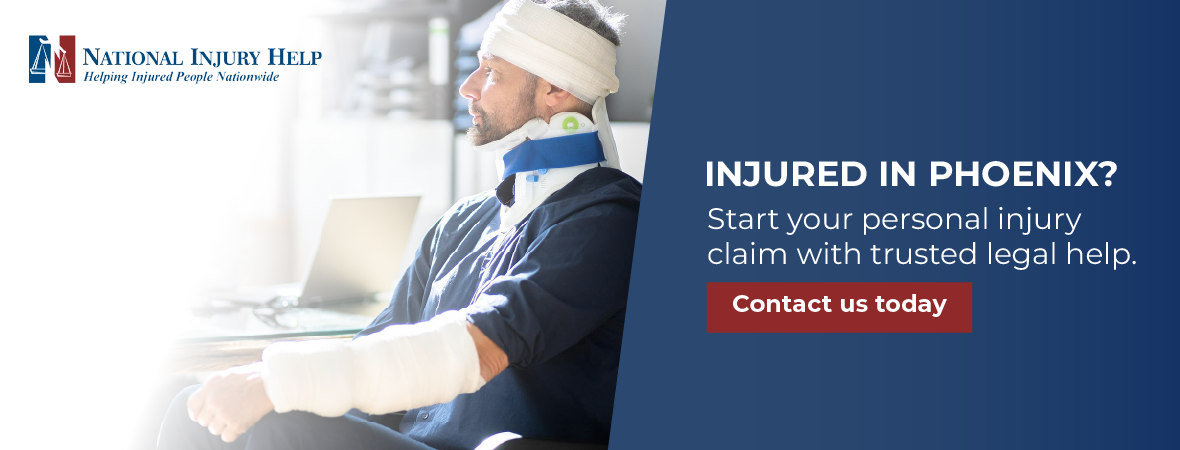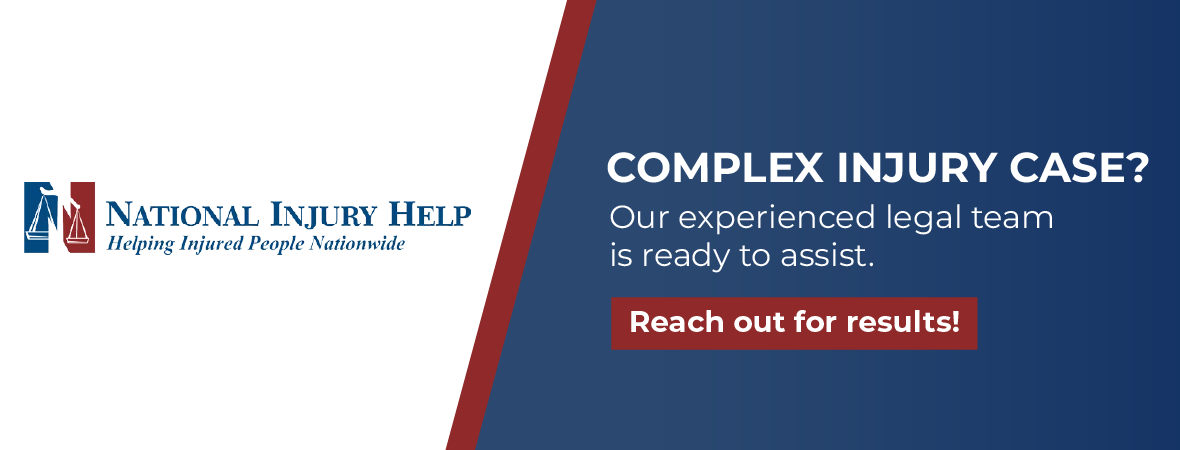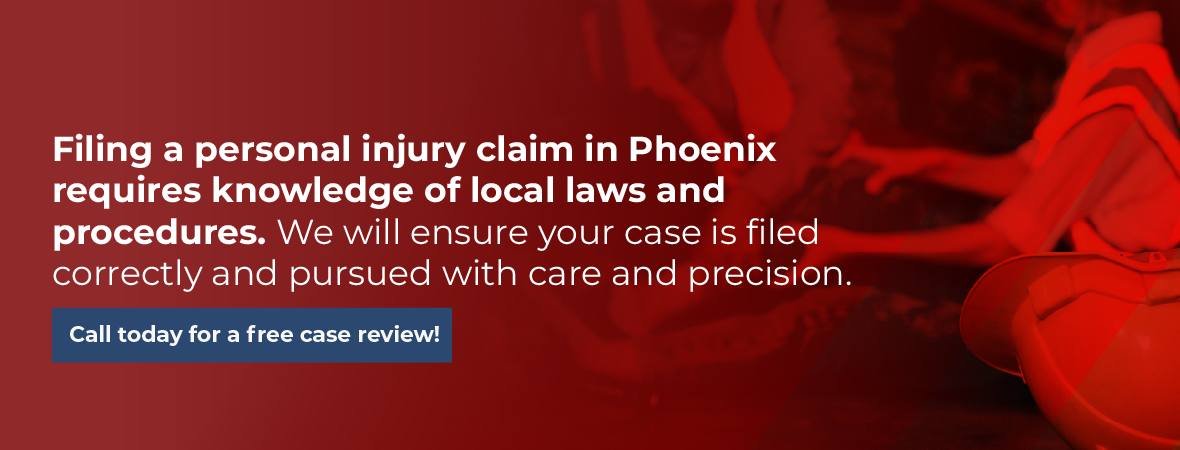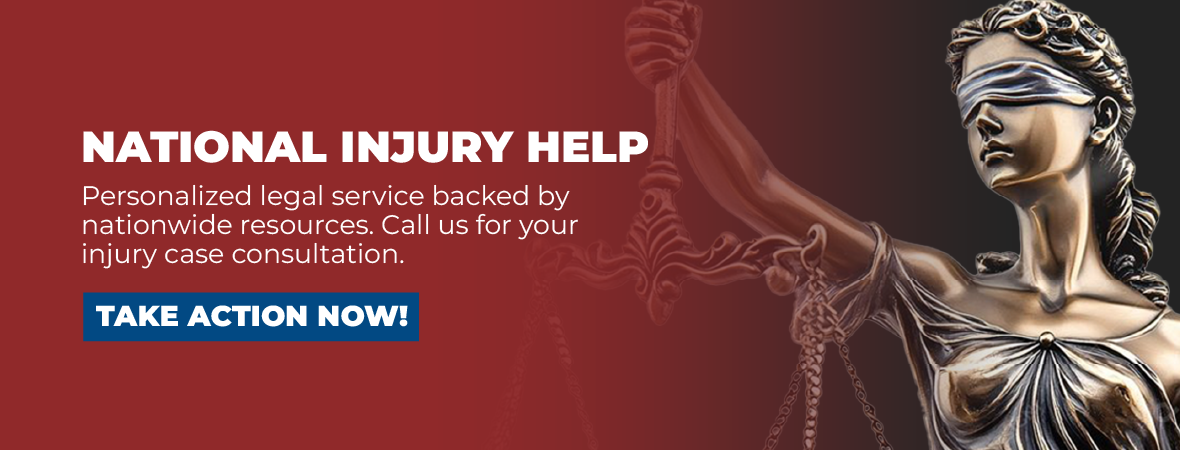Taking the right steps early can make a significant difference in the strength and value of your claim. Don’t wait, get the legal guidance you need to protect your rights and secure the compensation you deserve.
Accidents occur every day throughout Phoenix, whether on busy freeways like I-10 and Loop 202, in neighborhoods near Roosevelt Row, or while shopping at Desert Ridge Marketplace. When these accidents result from someone else’s negligence, Arizona law allows victims to seek compensation. However, filing an injury claim in Phoenix can often be a complex process. It can feel overwhelming, especially when you’re also facing pain, medical bills, and time off work.
This guide will help you navigate the personal injury process in Arizona. It outlines what to expect, the steps to take, and how an experienced Phoenix personal injury lawyer can assist you in recovering the compensation you deserve..
Step 1: Seek Immediate Medical Attention
The first step after any injury is prioritizing your health. Whether you’ve been involved in a car crash on Camelback Road or slipped and fell at a local store in Ahwatukee, it’s essential to see a medical professional as soon as possible.
Getting medical care not only helps with your physical recovery, but it also documents the extent of your injuries. Medical records from providers like Banner–University Medical Center Phoenix or St. Joseph’s Hospital can later serve as powerful evidence for your claim. Delaying treatment can hurt both your health and your case.
Step 2: Document the Accident Scene
If you’re physically able, gather as much evidence at the scene of the accident as possible. This documentation will be critical when you start a personal injury case.
Helpful information to collect includes:
- Photos of the accident scene, injuries, and property damage
- Names and contact info of witnesses
- The other party’s contact and insurance information
- Any incident or police reports (especially in car accidents or assaults)
For example, if you were injured at the intersection of 7th Avenue and Indian School Road, a notoriously busy and high-risk crossing, snap photos of the road conditions, signage, and vehicle positions. This kind of detail can help prove fault and build a stronger claim.
Step 3: Report the Accident
In many cases, you’re required to report the accident:
- For car accidents, call law enforcement and file a report with the Phoenix Police Department.
- For workplace injuries, report the incident to your supervisor immediately.
- If you were injured on someone else’s property (like a grocery store), notify the business manager and request a written incident report.
Reporting ensures that there’s a formal record of the incident. Insurance companies often try to minimize or deny claims if there’s no report filed at the time of the injury.
Step 4: Consult a Phoenix Personal Injury Lawyer
This is one of the most important steps in the personal injury process in Arizona. Consulting a lawyer early in the process protects your rights and gives you the best chance of recovering full compensation. An experienced Phoenix personal injury attorney will evaluate your case, help preserve evidence, and guide you through the legal process.
Your lawyer will also shield you from aggressive insurance adjusters who may contact you soon after your injury, pushing for a quick (and often lowball) settlement. Without legal guidance, you could unknowingly waive your right to future compensation.
Step 5: Understand Arizona’s Statute of Limitations
Every state has a time limit on how long you have to file a personal injury lawsuit. In Arizona, the statute of limitations is typically two years from the date of the injury. However, certain cases, such as claims involving government entities, have even shorter deadlines.
For example, if you were injured on public property owned by the City of Phoenix or struck by a Valley Metro bus, you may have only 180 days to file a Notice of Claim and one year to file a lawsuit. A Phoenix personal injury lawyer can ensure all deadlines are met and your rights are preserved.
Step 6: Your Attorney Investigates and Builds Your Case
Once you hire an attorney, they will begin the investigation phase. This includes gathering police reports, medical records, witness statements, surveillance footage, expert testimony, and more. They will also calculate the full value of your claim based on:
- Current and future medical expenses
- Lost wages and diminished earning capacity
- Pain and suffering
- Emotional distress
- Permanent disability or disfigurement
Depending on the complexity of your case, your attorney may work with medical experts, accident reconstructionists, or economists to demonstrate the full extent of your damages.
Step 7: Filing the Personal Injury Claim
Now that your evidence is assembled, your lawyer will file a claim with the responsible party’s insurance company. If the insurance company refuses to settle fairly, your attorney may recommend filing a lawsuit in civil court, typically with the Maricopa County Superior Court in Downtown Phoenix.
In most cases, a formal demand letter is submitted first. This letter outlines:
- The facts of the case
- The injuries sustained
- The damages incurred
- A demand for compensation
The insurance company then responds, often initiating a negotiation process. If a fair settlement is reached, the case ends here. If not, your lawyer will move forward with litigation.
Step 8: Negotiation and Settlement Talks
Most personal injury claims settle out of court. Your Phoenix attorney will negotiate aggressively on your behalf, aiming for a settlement that fully compensates you for your injuries and losses. Settlement talks can take weeks or months, depending on the complexity of the case and the insurance company’s willingness to cooperate.
During this phase, your attorney will:
- Respond to counteroffers
- Handle all communications with insurance adjusters
- Advise you on whether to accept or reject offers
You remain in control throughout the process; your personal injury lawyer will recommend the best course of action, but you make the final decision.
Step 9: Going to Trial (If Necessary)
If settlement negotiations fail, your case may go to trial. While many injury victims are understandably nervous about this possibility, your attorney will prepare thoroughly, presenting your case to a jury with compelling evidence and expert testimony.
Trials take place in the civil courts and are overseen by a judge. Your lawyer will make opening and closing arguments, question witnesses, and fight to prove that the other party’s negligence caused your injuries.
Although trials are less common, your attorney’s willingness to go to court and their reputation for success can often pressure the insurance company into offering a better settlement before the trial begins.
Special Considerations for Claims Involving Catastrophic Injuries
Not all personal injury cases are alike. When an accident results in catastrophic injuries, such as traumatic brain injuries, spinal cord damage, amputation, or permanent disfigurement, the legal and financial stakes are much higher. These types of injuries often require lifelong medical care, assistive devices, and major lifestyle adjustments. As a result, the compensation needed to cover future expenses is significantly greater than in cases involving minor injuries.
If you or a loved one sustained a catastrophic injury in a crash on I-10, a fall at a commercial property near Arizona State University Downtown, or a motorcycle accident along Grand Avenue, it’s crucial to work with an attorney who understands how to assess long-term damages. Your lawyer will need to work closely with medical experts, life care planners, and vocational specialists to determine the full scope of your needs over time.
Catastrophic injury claims also often involve more pushback from insurance companies, who may challenge the extent of your disability or argue over the value of your future care. This makes aggressive legal representation all the more important. Your attorney must be ready to fight for compensation not only for medical expenses and lost income but also for pain and suffering, emotional trauma, and loss of quality of life.
Filing an injury claim in Phoenix involving a catastrophic injury demands careful planning and thorough legal knowledge. Don’t settle for less than what you need to recover and rebuild. Get help from a team that’s equipped to handle high-stakes cases with confidence and compassion.
How Long Does the Process Take?
The length of the personal injury process in Arizona varies widely depending on the case. Some claims settle in a few months, while more complex or disputed cases may take over a year, especially those involving multiple defendants or large corporations.
Factors that affect your timeline include:
- The severity of your injuries
- The time needed for medical recovery
- Disputes over liability
- Court scheduling and trial preparation
While it may take time, pursuing a claim properly ensures you get the compensation you need, not just a quick payout that barely covers your expenses.
Get Help From a Team With a Proven Track Record
Filing an injury claim in Phoenix can feel overwhelming, but you don’t have to go through it alone. With over $100 million recovered for clients in personal injury cases across Arizona and nationwide, this legal team knows how to deliver results. Their experience, combined with a modern, client-focused approach under Arizona’s Alternative Business Structure (ABS) model, ensures you get top-tier representation and dedicated support from day one.
Whether your injury occurred in Downtown Phoenix, on the streets of North Scottsdale, or while driving along I-17, you deserve compensation for your losses and an advocate who knows how to get it.
Contact National Injury Help today at 1 (800) 214-1010 to start your personal injury case with our team of trusted Phoenix personal injury lawyer. The consultation is free, and there’s no fee unless you win. Let us help you file your injury claim in Phoenix and fight for the justice you deserve.
Frequently Asked Questions (FAQ): Filing a Personal Injury Claim in Phoenix
What is the first thing I should do after getting injured in an accident in Phoenix?
The absolute first step is to seek immediate medical attention for your health and to create a medical record of your injuries. This is crucial whether you were in a car crash on Camelback Road or had a slip and fall at a store in Ahwatukee. Medical records from providers like Banner-University Medical Center Phoenix will serve as important evidence for your claim.
How long do I have to file a personal injury lawsuit in Arizona?
In Arizona, the statute of limitations for most personal injury cases is two years from the date of the injury. However, there are important exceptions. For claims against government entities, like the City of Phoenix or Valley Metro, you may have as little as 180 days to file a Notice of Claim. It is critical to consult a lawyer immediately to ensure you do not miss these deadlines.
Do I really need a lawyer to file a personal injury claim in Phoenix?
While not legally required, consulting a Phoenix personal injury lawyer early on is one of the most important steps. An attorney protects your rights, handles aggressive insurance adjusters, and ensures you recover full compensation. They also understand local courts, like the Maricopa County Superior Court, and can build a strong case by gathering evidence like police reports and witness statements from specific locations, such as the busy intersection of 7th Avenue and Indian School Road.
What if my accident involved a catastrophic injury, like a spinal cord or traumatic brain injury?
Cases involving catastrophic injuries from accidents on I-10, Grand Avenue, or at a commercial property near ASU Downtown have much higher stakes. These injuries often require lifelong care. Your attorney will need to work with medical experts and life care planners to calculate long-term damages. Insurance companies often push back harder on these claims, making experienced legal representation even more essential to fight for the compensation you need for future expenses and loss of quality of life.
How long does the entire personal injury process take in Phoenix?
The timeline varies significantly. A straightforward claim might settle in a few months, while a complex case involving disputed liability or catastrophic injuries could take a year or more. Factors include the severity of your injuries, the time needed for medical recovery, and court scheduling. Your attorney will work to resolve your case efficiently while ensuring you receive a fair settlement, not just a quick, low offer.
What should I do if the insurance company for the at-fault party contacts me?
Do not give a recorded statement or accept any settlement offer before speaking with your own attorney. Insurance adjusters often contact victims soon after an accident to push for a quick, low settlement. Your lawyer will handle all communications with the insurance company to protect your rights and the value of your claim.
What happens if my case doesn’t settle and goes to trial?
While most cases settle out of court, your attorney will be prepared to take your case to trial if necessary. This involves presenting your case to a jury at the Maricopa County Superior Court. A lawyer’s willingness and ability to go to trial can often pressure an insurance company to offer a better settlement beforehand.
What kind of compensation can I recover in a Phoenix personal injury case?
You may be entitled to compensation for various losses, including current and future medical expenses, lost wages, pain and suffering, emotional distress, and permanent disability. Your lawyer will calculate the full value of your claim based on the specific details of your accident and injuries.








